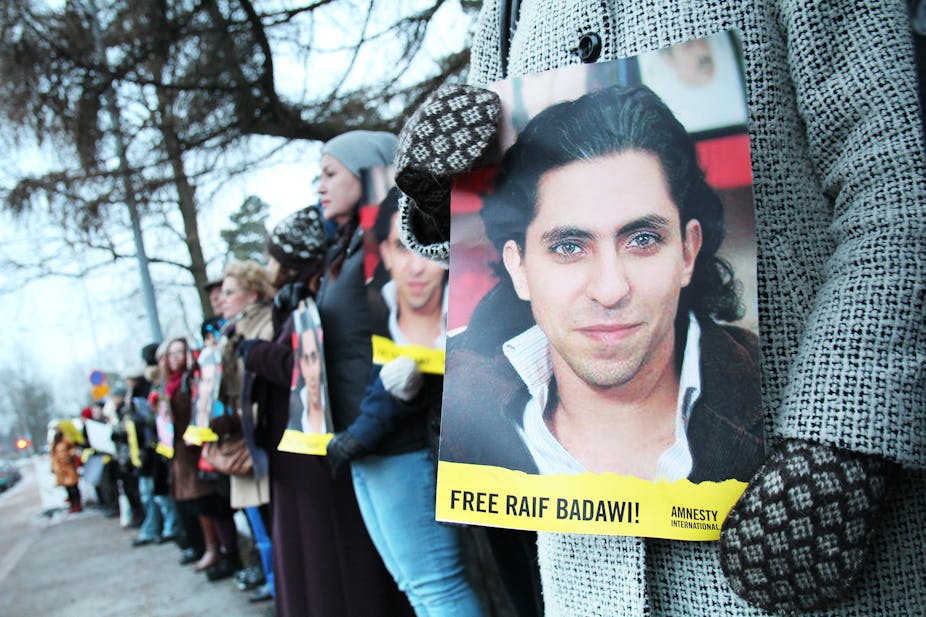Saudi Arabian authorities have upheld the sentence of 10 years’ imprisonment and 1,000 lashes handed down to blogger Raif Badawi. While the court judgment to uphold the punishment of 1,000 lashes has received particular scrutiny, corporal punishment is still routinely used as an official part of criminal justice by many countries – and that’s a clear violation of international law.
Even though punishments such as flogging are routinely handed down by courts in Saudi Arabia and elsewhere, international human rights law heavily restricts the use of corporal punishment as a part of criminal justice.
The Universal Declaration on Human Rights, the International Covenant on Civil and Political Rights and the Convention Against Torture all prohibit torture and “cruel, inhuman, or degrading treatment or punishment”. Various United Nations organs, including the UN High Commissioner for Human Rights) and the UN Human Rights Committee, have made it clear that flogging amounts at the very least to cruel and inhuman punishment.
Nonetheless, the use of flogging and other corporal punishments continues in many countries.
Bad company
While Saudi Arabia stands out as a particularly extreme user of corporal punishment, it is by no means alone in its continued use of physical abuse to sanction criminals.
In Afghanistan, a proposal to reform the criminal code was put forward in 2013 that would have reintroduced stoning, flogging and amputation. In Iran, a wide range crimes are punishable by flogging, including the consumption of alcohol, flouting of public morals and the mixing of sexes in certain public areas. In certain circumstances, flogging is also used to maximise the suffering of those criminals sentenced to death.
Similarly, in Saudi Arabia, flogging is not limited as a punishment merely for the crime of “insulting Islam” (as in Badawi’s case); it’s also used as a punishment for sexual deviance (which can simply mean being suspected of being homosexual) or for the crime of adultery. In some cases, women have been convicted and flogged for adultery despite claiming to have been raped, having been deemed adulterers because they were unable to prove who their rapists were.
Other methods continue to proliferate. Besides flogging, Saudi Arabia is also well-known for using forced amputations. Stoning, meanwhile, is used in assorted countries and by Islamic State, and essentially amounts to capital punishment.
All in all, corporal punishment is still used all over the world including such diverse places as Yemen, Trinidad and Tobago and Tanzania.
No exceptions
While Saudi Arabia’s continued and consistent use of corporal punishment is at odds with international law and has seen the country roundly criticised on numerous occasions, the Saudi government has been consistently unwilling to change its position.
In 2004, the Saudi delegate to the UN Committee Against Torture fiercely defended the legal traditions of Saudi Arabia and rejected the convention as international interference in domestic legal affairs by “Westerners who were unfamiliar with Islamic law”. He stated that anyone who petitioned for or attempted to amend corporal punishment laws in Saudi Arabia, which of course claim a religious basis, was “not a good Muslim” and failed to recognise that the point of corporal punishment is to “protect society”.
This is the standard Saudi defence of corporal punishment, but it appeals to a legal principle that does not actually exist. While the Saudi government supposedly holds the Koran to be divine law and therefore defends its domestic legislation as sacrosanct, international conventions simply do not allow rights to be violated because domestic law “overrides” them, whatever the rationale.
Stand firm
In the short term, the future for victims of corporal punishment in Saudi Arabia and in other countries that practice it looks bleak indeed. Despite international condemnation, there simply is no serious impetus for change on the ground.
This is particularly true in conservative countries whose governments use strict religious doctrine to control the population, a style of politics in which Saudi Arabia is something of a world leader. And while the United Nations repeatedly records and condemns the Saudi government’s violations of fundamental rights, it is unable to enforce change.
But the long-term prospects for change are far brighter. Just because international law is sometimes very difficult to implement at the national level does not make it meaningless. That Raif Badawi’s name is in the public arena, with governments and international organisations exerting such pressure on the Saudis to call off his flogging, has undoubtedly affected the Saudi perspective.
While his sentence has been upheld, Raif Badawi’s next flogging is currently still pending. The Saudi government has claimed that this is for medical reasons, as the scars from his first round have not sufficiently healed – but many commentators believe that the real reason is the sheer international pressure on the Saudi government.
This pressure needs to continue if the use of corporal punishment to control citizens becomes a complete political taboo. No state should think it can afford the opprobrium that greets this barbaric and repressive practice.
If we get to a point where the norm against flogging and the like is that strong, other forms of repressive control over the general population may also start to relax – and greater standards of human rights protection, including the right to free speech, may come within reach.

